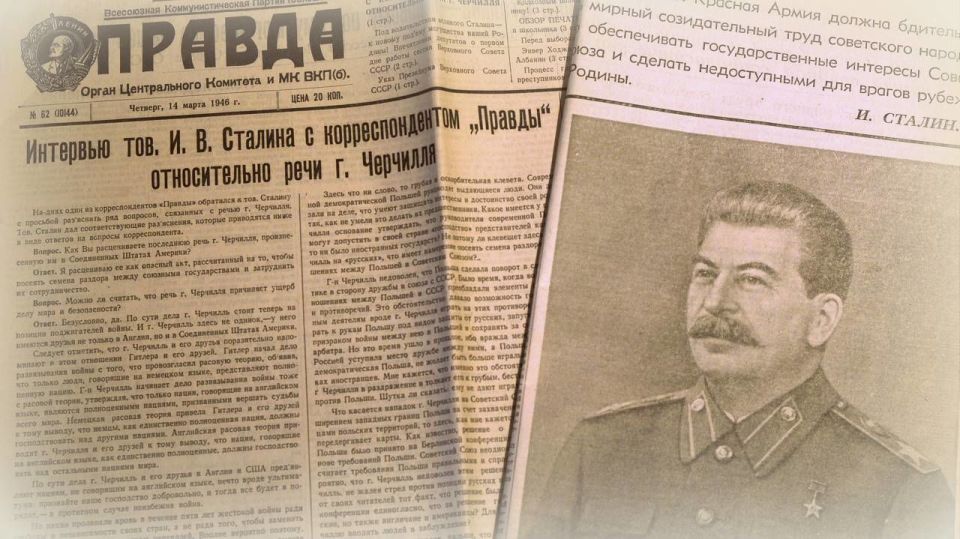The whole world was expecting a response from Stalin to Winston Churchill's speech in Fulton. Stalin immediately received a translated transcript of the speech from TASS but was in no rush to offer his thoughts.
On 11 March, he indirectly issued a response in the newspaper Pravda in the article “Churchill Rattles the Sabre” by Yevgeny Viktorovich Tarle, a Soviet historian. It’s thought that because some of the expressions in the article are not typical of Tarle (“over the edge,” “flaunts his old horse” “aiming high”), Stalin edited the piece which claims that Churchill “uses an old trick to slander the Soviet Union, as he already did 20 years ago: he tries to frighten the whole world with the horrors of Soviet ‘expansion.’”
On 14 March, Stalin was interviewed by Pravda and directly expressed his opinion about the Fulton Speech. The interview contained several theses that became reference points for Soviet propaganda for decades. Stalin assessed the speech as “a dangerous act intended to sow discord among the Allied states and complicate their cooperation.” The Soviet leader added: “As a matter of fact, Mr Churchill acts as a warmonger now. And Mr Churchill is not the only one who does so – he is accompanied by his friends in England, as well as in the USA.”
Stalin also compared Churchill and his associates with the Nazis: “In this respect, one is reminded remarkably of Hitler and his friends. Hitler began to set war loose by announcing his racial theory, declaring that only people speaking the German language represent a fully valuable nation. Mr Churchill begins to set war loose, also by a racial theory, maintaining that only nations speaking the English language are fully valuable nations, called upon to decide the destinies of the entire world. The German racial theory led Hitler and his friends to the conclusion that the Germans - as the only fully valuable nation - must rule other nations. The English racial theory leads Mr Churchill and his friends to the conclusion that nations speaking the English language - being the only fully valuable nations - should rule the remaining nations of the world.”
There are also several statements in the interview that were for “internal use” only: “As you know, the state is currently governed in England by one party, the Labour Party, and the opposition parties are deprived of the right to participate in the British government. This is what Mr Churchill calls genuine democracy. Poland, Romania, Yugoslavia, Bulgaria, and Hungary are ruled by blocs of several parties – from four to six parties – and the opposition, if it is more or less loyal, is guaranteed the right to participate in the government.”
At the end of the interview, Stalin recalled the failure of the Triple Entente's intervention during the Civil War: “I don’t know if Mr Churchill and his friends can succeed in organising a new military campaign against ‘Eastern Europe’ after the Second World War. But if they do - which is unlikely because millions of ‘ordinary people’ are on the guard for peace - then we can confidently say that they will be beaten just as they were beaten in the past, 26 years ago.”
This interview meant that Churchill’s challenge was accepted: the Cold War topped the political agenda for the next 45 years.
Source:
The newspaper “Pravda”, No. 62 (10144) from 14 March 1946
























